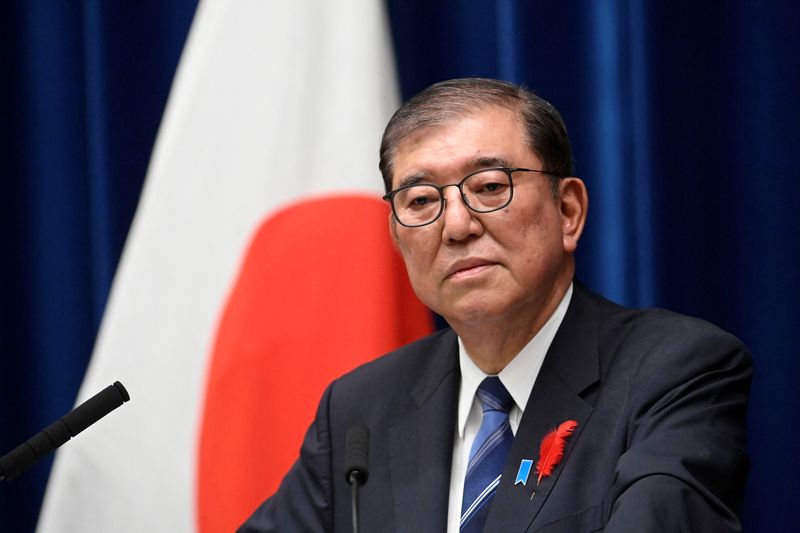By Leika Kihara
TOKYO (Reuters) – Japanese Prime Minister Shigeru Ishiba’s administration has pledged to draft another big spending package, shifting further away from his calls for fiscal discipline in a move that will likely lead to increased borrowing.
Deputy Chief Cabinet Secretary Kazuhiko Aoki told a news conference on Wednesday the government will draft a package that will exceed the size of last year’s stimulus.
On Tuesday, Ishiba said in an election campaign speech the government would aim for a spending package funded by a supplementary budget that exceeds last year’s 13 trillion yen ($87 billion).
Such big spending would keep Japan an outlier among advanced nations that had mostly phased out crisis-mode stimulus.
It would also come at a time when the Bank of Japan is raising interest rates from near-zero levels, adding to the cost of funding Japan’s public debt that already stands at double the size of its economy.
While expectations that the BOJ will go slow with raising borrowing costs has kept the yields on 10-year Japanese government bonds (JGB) below 1%, the prospect of more debt issuance may start to hurt bond market sentiment, analysts say.
“Some (players) became cautious of buying JGBs as concern emerged over the risk of increasing debt issuance,” said Katsutoshi Inadome, senior strategist at Sumitomo Mitsui (NYSE:SMFG) Trust Asset Management.
The fading chances of Japan meeting a commitment to achieve a primary balance surplus in fiscal 2025 could also weigh on bond prices, he added.
Analysts at SMBC Nikko Securities predict the government will need to issue over 10 trillion yen in new debt to fund a supplementary budget sized more than 13 trillion yen this year.
That would come on top of 182 trillion yen worth of JGBs already scheduled to be sold under current fiscal year’s budget.
In the past, Japan has used supplementary budgets, typically worth a few trillion yen, to deal with one-off, emergency spending, such as disaster relief.
That changed in 2020, when the size ballooned to 73 trillion yen to combat the COVID-19 pandemic. Since then, Japan has continued to compile outsized, largely debt-funded, supplementary budgets. Last year, nearly 9 trillion yen of the 13-trillion-yen spending was funded by new debt.
Once considered a fiscal and monetary hawk, Ishiba had toned down his earlier calls for Japan to wean off the radical stimulus, named “Abenomics” after the late former premier Shinzo Abe.
Since taking over on Oct. 1, Ishiba has stressed that his focus is to get the economy to fully shake off the growth-sapping deflation of the last three decades.
While few analysts expect the ruling coalition to lose power in a general election scheduled on Oct. 27, some predict a tough battle that could keep Ishiba under pressure to appease voters with promises of big spending.
Japan’s public debt is the largest among advanced nations. Its ratio of government spending to gross domestic product stood at 42.3% compared with 37.0% in the U.S. and the G7 average of 41.2%, according to estimates by Japan’s finance ministry.
($1 = 149.2700 yen)




























